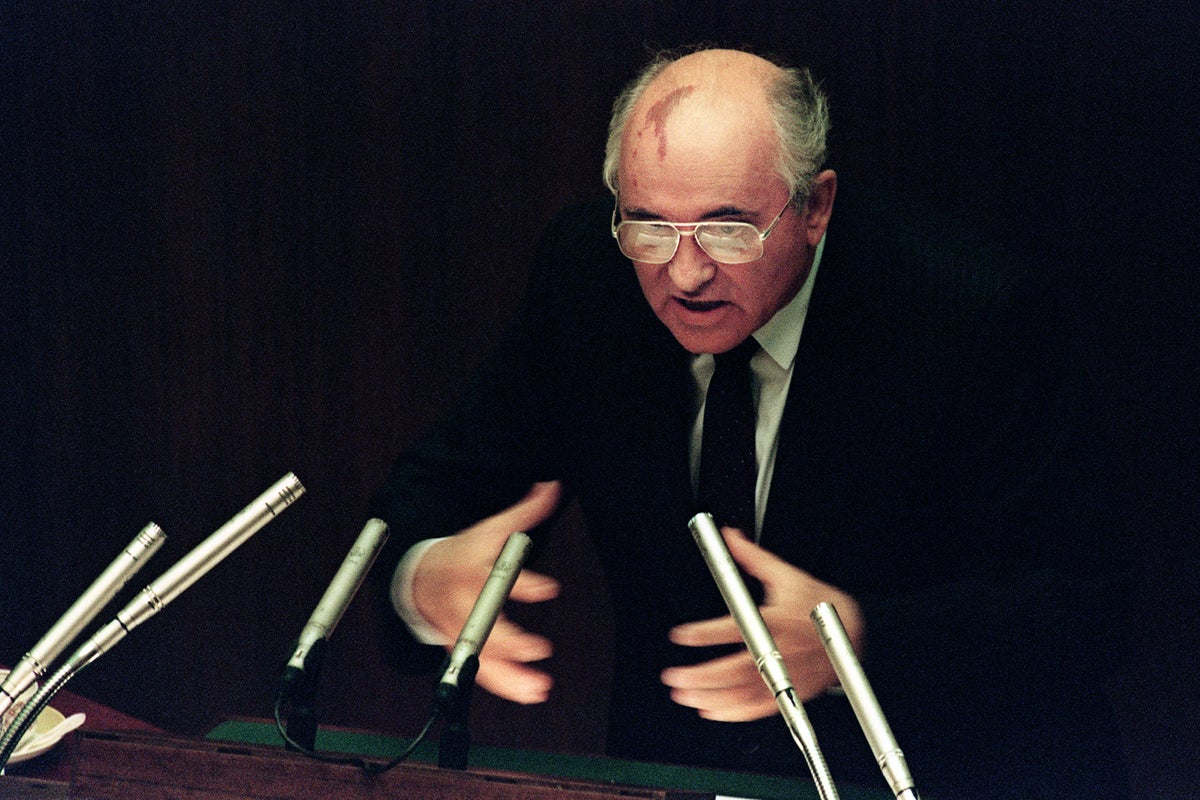
This story was originally published on 22 August 1991. It has been republished following Mikhail Gorbachev’s death on Tuesday
President Mikhail Gorbachev returned to the seat of power in the Soviet capital today following the collapse of the three-day coup and the arrest of members of the disbanded junta.
The praesidium of the Supreme Soviet, the federal parliament, formally dissolved the self-proclaimed eight-man State of Emergency Committee, which announced Monday morning that it had seized power in the country, and a parliamentary official said legal proceedings have been initiated against its members, who included the country’s vice president, defence minister, interior minister and state security chief.
As news of the collapse of the coup spread throughout the country Wednesday, people here gathered on street corners to cheer the departing soldiers. A three-mile-long column of about 180 tanks and 60 trucks left Moscow in the afternoon as bystanders chanted “Yeltsin, Yeltsin” – for Russian republic President Boris Yeltsin, who had led opposition to the coup from the barricaded Russian parliament building. Troops in the Baltic republics also began pulling back to their bases.
Gorbachev, who had been placed under house arrest by coup figures at his Black Sea retreat Sunday afternoon, flew back to Moscow shortly after midnight to resume his duties, arriving here at 2.15am. local time. With him were officials of the Russian republic who had been sent to accompany him. At the airport, Gorbachev told Soviet television that the Soviet Union would have faced disaster if the State of Emergency Committee had succeeded, and hailed the collapse of the coup as a victory for perestroika.
Recounting his time in captivity, the president said he refused to deal with the coup plotters: “The world must know what they were up to and what they wanted to do with me ... what they attempted to do to the president and his family in these days, when for 72 hours they surrounded him with troops on sea and on land and wanted to break his willpower. But they lost.”
Yeltsin and the independent news agency Interfax reported the arrests of most of the leaders of the coup. Interfax said one of the leaders, KGB chief Vladimir Kryuchkov, was brought to Moscow aboard Gorbachev’s plane under arrest.
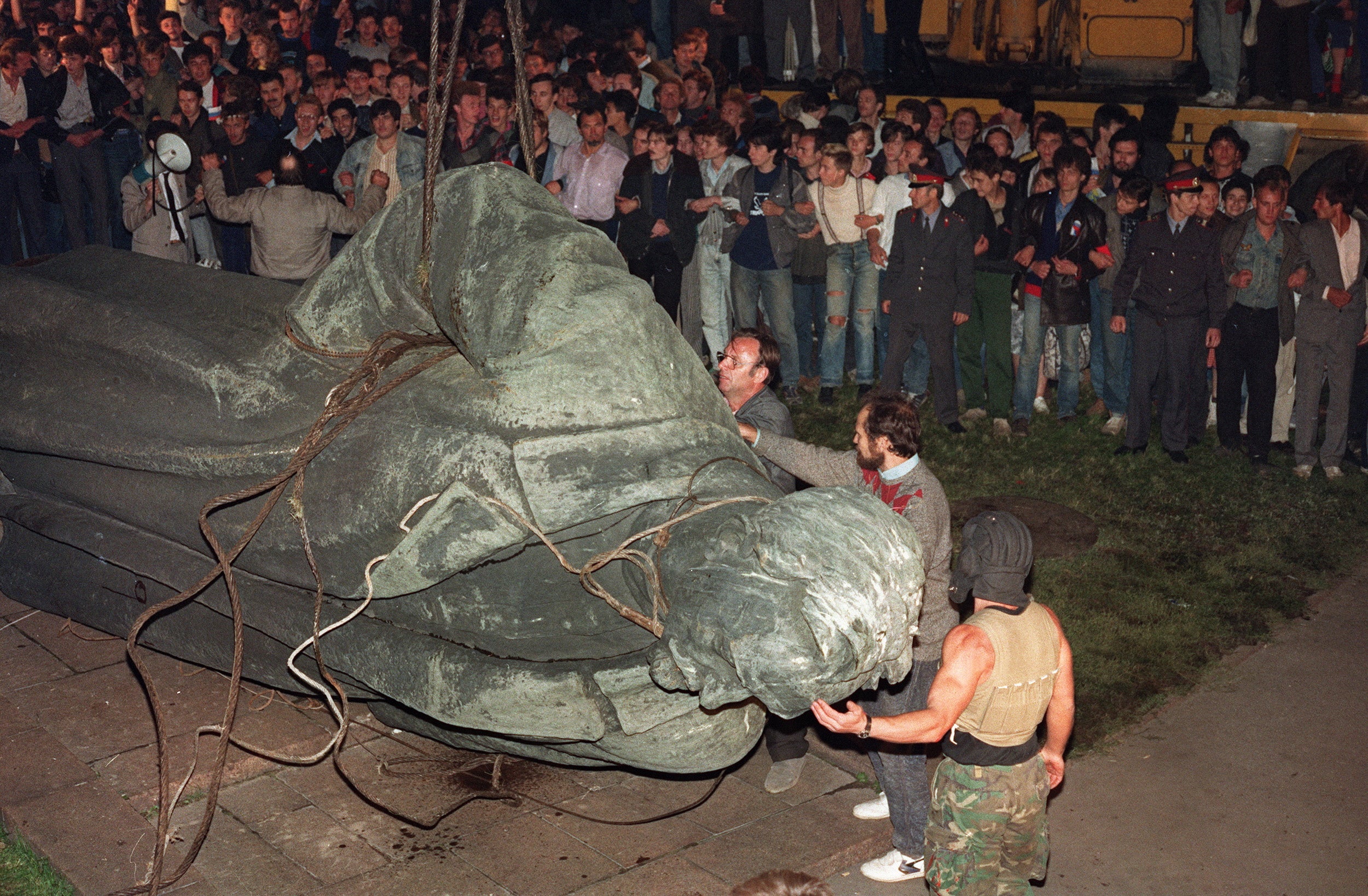
Quoting an official Russian government spokesman, Interfax said three other members of the State of Emergency Committee were arrested after they arrived at Gorbachev’s residence in the Crimea Wednesday in an attempt to speak with him: Defence minister Dmitri Yazov, deputy security council chairman Oleg Baklanov and AI Tizyakov, head of the industrialists’ union.
Interfax said interior minister Boris Pugo tried to take his own life along with his wife when police came to his home to arrest him today, but the report could not be confirmed. Pugo was said to be hospitalised in serious condition. Another member of the coup, prime minister Valentin Pavlov, also is in the hospital.
Speaking this morning before the Russian parliament, Yeltsin said vice president Gennady Yanayev, who had made himself acting president, also was in custody but the fate of farmers’ leader Vasily Starodubtsev was not immediately known. News services reported this morning that all eight plotters were in custody, but the report could not be confirmed.
After regaining his freedom late Wednesday, Gorbachev phoned Yeltsin and leaders of other republics as well as President [George HW] Bush to tell them the coup was over
“Bulletin – Gorbachev in full control of the country”, announced the official Tass news agency Wednesday after one of the most dramatic days in Soviet or Russian history. Just a few hours earlier, Tass had been issuing draconian decrees from the State of Emergency Committee, threatening to intern or fire anybody who failed to carry out its orders.
The failure of the coup seems likely to accelerate the collapse of communism in the Soviet Union and boost the authority of democratically elected leaders who resisted the seizure of power. Yeltsin has already begun a wholesale purge of local officials who supported the unconstitutional takeover.
The attempt to restore a hard-line Communist regime failed when it became clear that the leaders of the coup would be able to achieve their goal only through massive bloodshed, a step that could have plunged the country into civil war. Tens of thousands of demonstrators formed human chains around the Russian parliament, which also was defended by several dozen tanks and armoured cars manned by Soviet troops who had allied themselves with the Yeltsin camp.
After regaining his freedom late Wednesday, Gorbachev phoned Yeltsin and leaders of other republics as well as President [George HW] Bush to tell them the coup was over. In a statement read on Soviet television, Gorbachev told the nation that he was in full control and praised “the decisive actions of the democratic forces of the country” for restoring constitutional order. He added that the “adventurists” would be held fully responsible for their “unlawful actions.” When he returned to Moscow, Gorbachev thanked Yeltsin for his role in thwarting “this shady enterprise.”
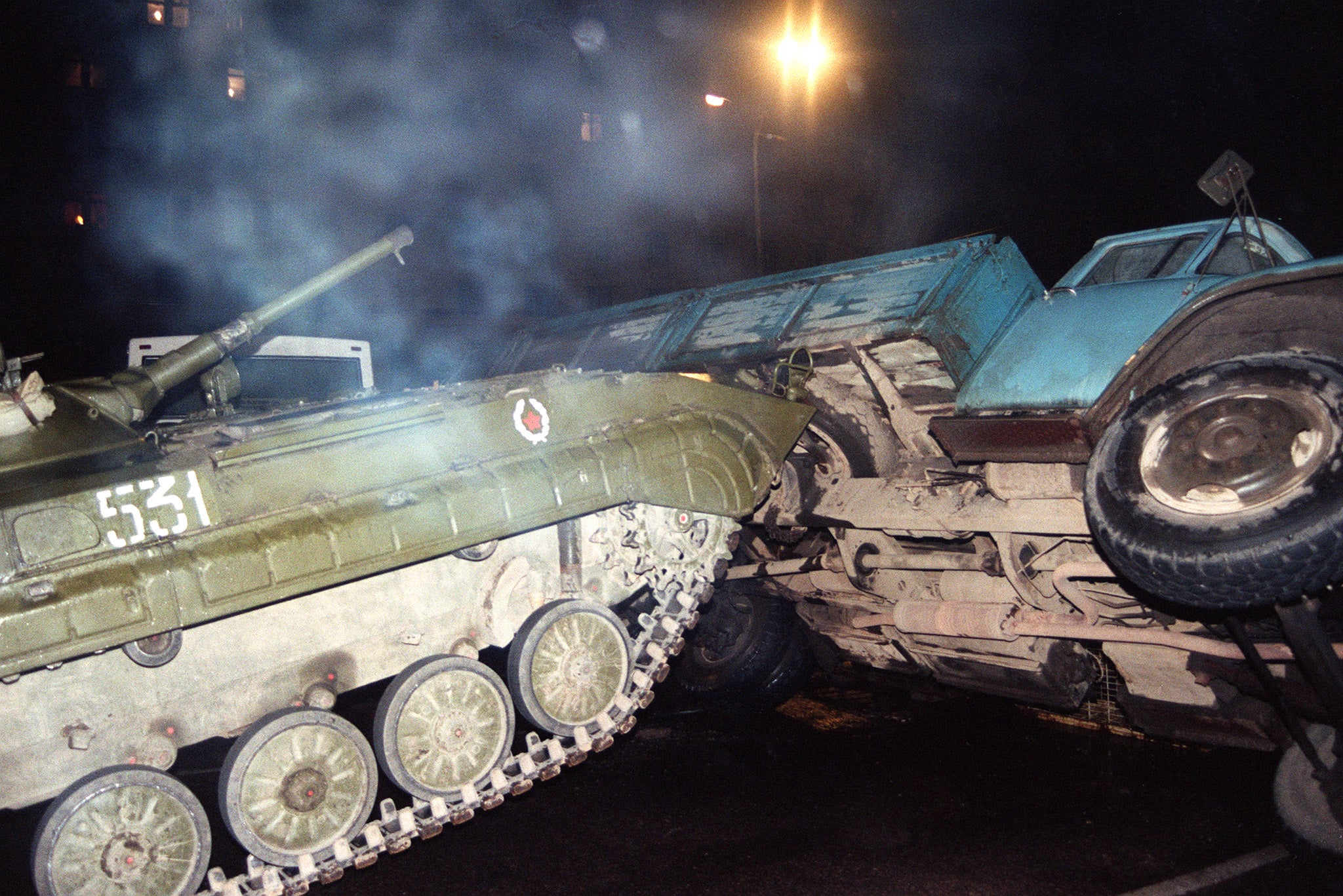
For his part, Yeltsin praised Russian officials who, while holed up in the parliament building during the coup, walked the halls “not with notebooks in their hands but with machine guns,” and he praised the people of Moscow and the republic. “We have the right to say Russia has saved the Union, and we have a right to be proud of that,” he told lawmakers this morning.
Russian officials said Gorbachev denied that he had been taken ill, the reason given by the State of Emergency Committee for transferring power to Yanayev. “I was in good health all the time,” he was quoted as telling Yeltsin.
Several members of the State of Emergency Committee, including Kryuchkov and Yazov, had flown to Crimea Wednesday in an attempt to explain their actions to Gorbachev, but he refused to see them, and they were later arrested. Yanayev was reported to have remained behind in the Kremlin.
According to Gorbachev aides, the coup began to disintegrate at 8pm Tuesday night when General Mikhail Moiseyev, the armed forces chief of staff – whom Gorbachev early this morning named acting defence minister – ordered a halt to the movement of troops toward the Russian parliament. But the failure of the coup was far from clear to people on the streets of Moscow, and there was a night of agonising tension as it appeared that the building was about to be stormed. According to Radio Russia, three people were killed and four injured in spontaneous clashes between troops and demonstrators.

By Wednesday morning, the coup leaders appeared to be trying to shift the blame for the fiasco onto one another. Prime Minister Pavlov complained to his deputies that he had received misleading information on Gorbachev’s state of health from Yanayev. Yanayev, for his part, tried to pin most of the responsibility on Kryuchkov in telephone calls to Russian parliamentary speaker Ruslan Khasbulatov, according to Russian television.
“The putschists were all too frightened to take responsibility for their actions – and that is why they failed,” said Yuri Ivanilov, a Russian legislator and supporter of Yeltsin. “There were soldiers who would have carried out an order to shoot, but nobody was willing to take the terrible responsibility of issuing such an order. This was not China or even Chile, where a Pinochet was willing to take responsibility on himself. You can’t organise a coup by committee.”
An emergency session of the Russian parliament convened Wednesday morning began on a note of grim defiance, as deputies stood to honour the deaths of the demonstrators the previous night. The mood changed to jubilation when Yeltsin announced that all eight members of the junta had left Moscow for Vnukovo airport. At Yeltsin’s suggestion, the parliament passed a resolution calling for the arrest of the state of emergency committee.
By mid-afternoon, Gorbachev aides who had previously kept a low public profile were holding press conferences to explain that they had been against the coup all along. Foreign minister Alexander Bessmertnykh, who earlier was reported to have been ill, insisted that the country’s foreign policy course remained unchanged, “just as charted by the president.”
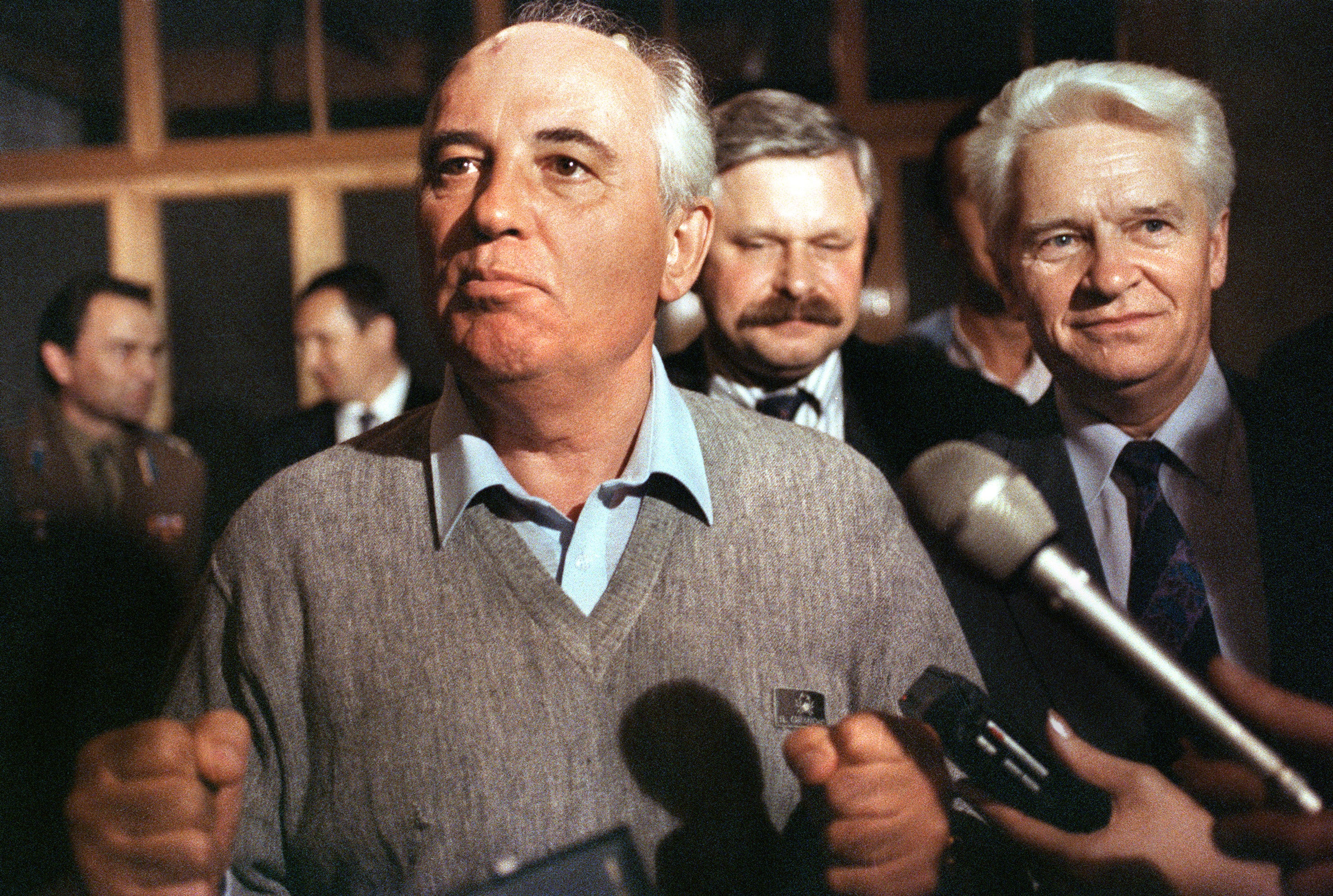
Soviet Communist Party leaders, who had kept silent during the first two days of the coup, denounced the attempt to “establish an authoritarian regime” and create “anti-constitutional bodies” and called for Gorbachev’s immediate release from house arrest. The party’s deputy general secretary, Vladimir Ivashko, suddenly recovered from a two-day illness to announce that he fully supported Gorbachev.
There was a similar overnight change of heart by General Nikolai Kalinin, the Moscow military commander, who Tuesday night was threatening Muscovites with 30-day prison sentences if they defied the overnight curfew. On Wednesday, he issued a statement saying that, in view of the “evolution of the socio-political situation,” he deemed it no longer “expedient” to maintain the curfew in the capital.
Radio and television stations forced off the air by the junta began broadcasting again. A commentator on Radio Russia speculated on the punishment that would be meted out to the coup leaders. Attempts to overthrow the state are punishable by sentences ranging from 20 years in prison to death. On the state-controlled channel, news readers who had read out the State of Emergency Committee’s decrees over the last two days looked nervously away from the camera as they announced that Gorbachev had, in fact, never been overthrown.
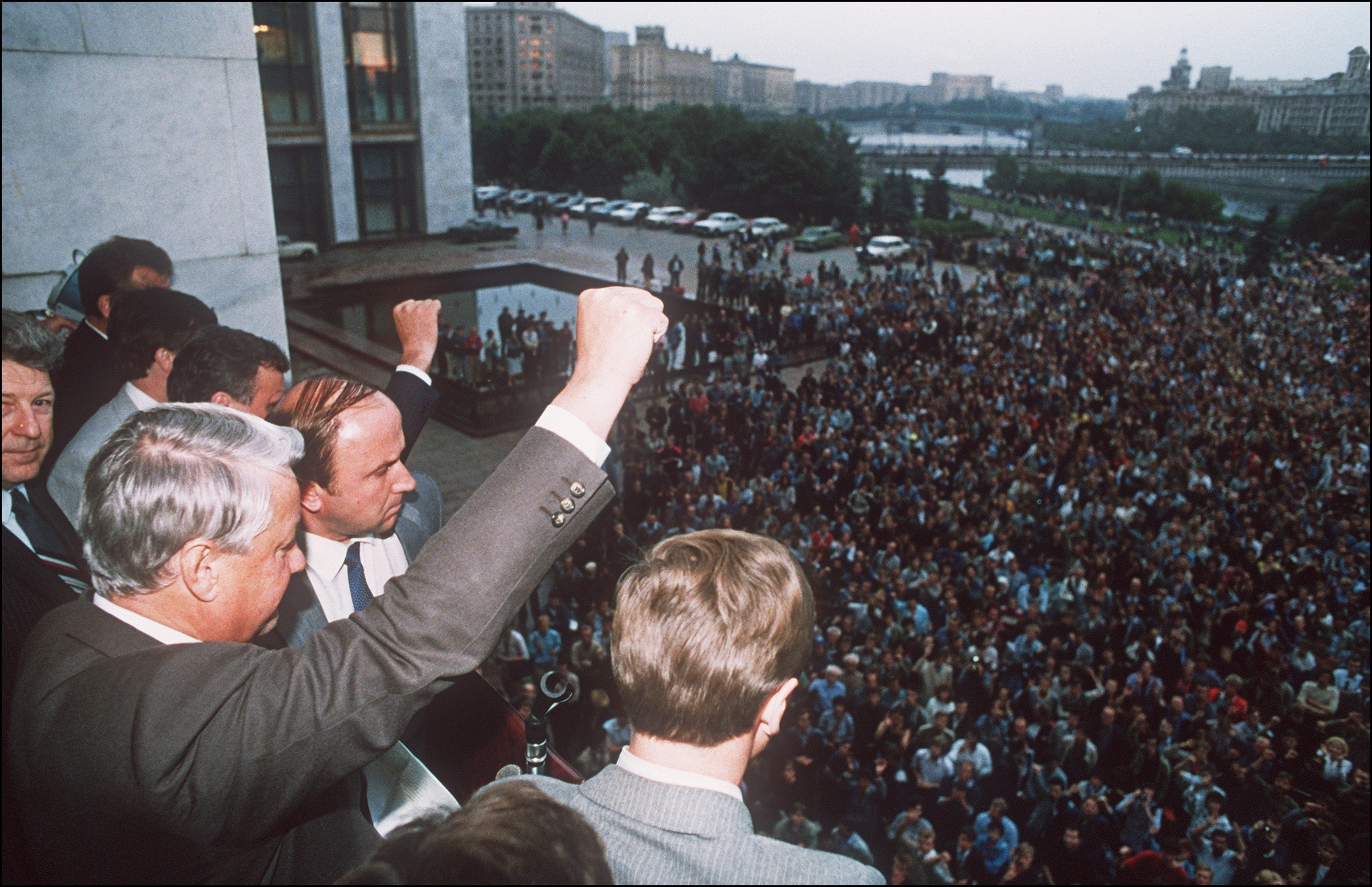
The deputy chair of the federal parliament, Ivan Laptev, went on television to announce that the parliamentary leadership had formally condemned the coup at a session this morning. Laptev said that a commission of inquiry had been set up to establish the “legal responsibility” of the members of the now defunct State of Emergency Committee.
Any punishment less than lengthy prison terms is unlikely to satisfy Yeltsin and other leaders who have criticized Gorbachev for allowing the putschists to remain in his government while publicly dissociating themselves from his policies. The Russian parliament passed a resolution insisting that all eight coup leaders be “brought to trial.”
Yeltsin also moved to punish the leaders of regional councils across the Russian republic that endorsed the coup. All have been dismissed from office. The regions will be run by direct appointees of the Russian president until new elections later this fall.
Democratic leaders made clear that they would use the failed coup to launch an all-out offensive against the Communist Party. Alexander Yakovlev, the party’s former ideologist who is widely regarded as being the intellectual father of Gorbachev’s perestroika reforms, accused the party of “keeping silent” when its leader was overthrown as president of the country.
“It is immoral for honest party members to stay in an organisation which did not oppose the state coup,” Yakovlev said in a television interview, noting that all eight members of the State of Emergency Committee were Communists.
Michael Dobbs is a former foreign correspondent and State Department reporter for The Washington Post.
© The Washington Post







